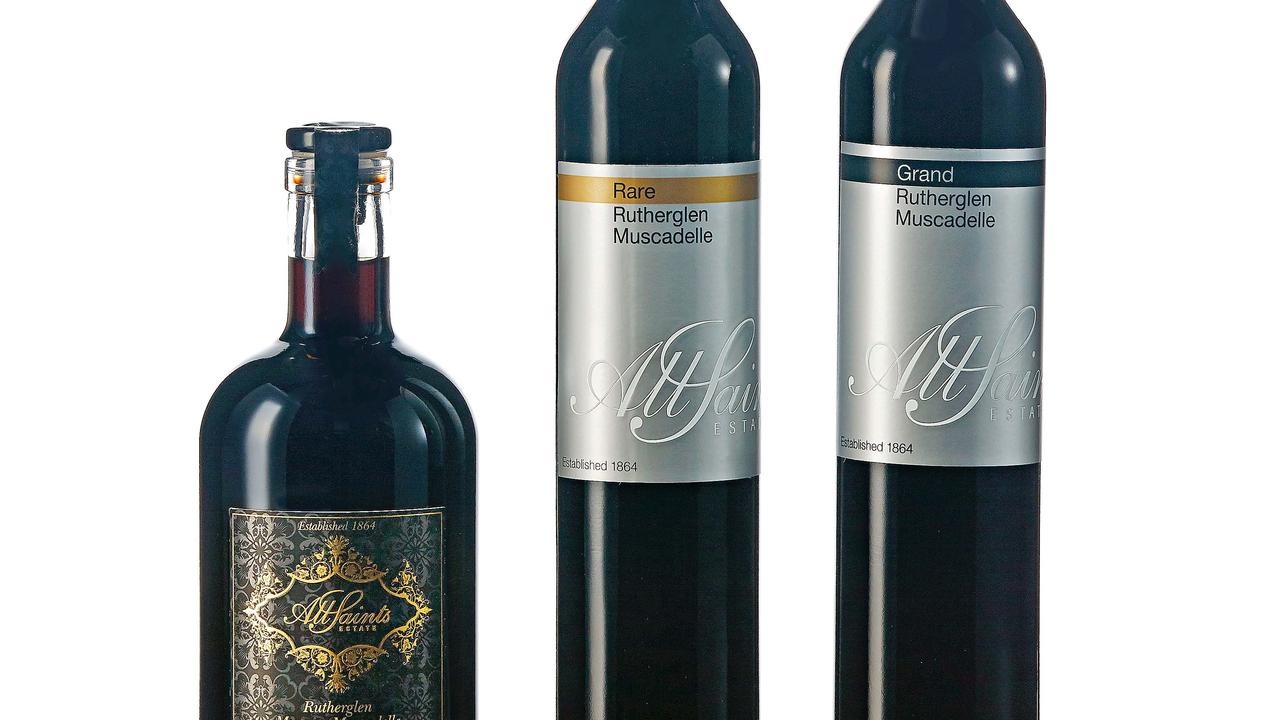High anxiety: Filmmaker David Michôd can’t believe his success
He has Brad Pitt and Hollywood’s deep pockets on side, but Aussie filmmaker David Michôd can’t quite believe he’s made it. By Megan Lehmann
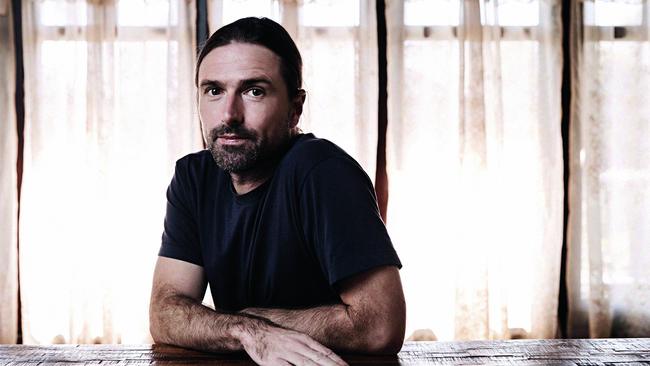
You know those men who plough through life with never a pause for self-doubt or introspection? David Michôd is not one of those guys. Sure, he knows them, well enough to have forged a shining career exploring their crash-or-crash-through masculinity on screen, but he observes from a distance. “David has a very acute, sensitive way of looking at the world and looking at people,” says Liz Watts, who produced his debut, Animal Kingdom, a film that’s practically pickled in testosterone. “He is fascinated with those kind of men who push through because he is not like that.”
Girlfriend Mirrah Foulkes, an actress and filmmaker, agrees Michôd is a deep thinker who “wears his self-doubt on his sleeve”. He’s interested in alpha males and their driving will to win “because they’re so different from him”. Male violence, particularly, intrigues him, as does its wellspring: male fear. “It’s definitely a fascination with ‘the other’,” says his friend, poet-turned-screenwriter Luke Davies. “I think all that is a pretty valid endeavour as an artist, since that violence and fear is basically what makes the world keep circulating in all its deep insanity.”
Sitting down with Michôd, the first thing you notice is that he is comfortable with silence. He welcomes it; marinates in it. Balanced on the edge of a rattan chair in his art deco Bondi apartment, the slight, 44-year-old Australian filmmaker pauses often while internally scanning an impressive vocabulary, letting the quiet deepen and stretch until he lands upon a word that’s just right. The second thing you notice is the large number of house plants casting afternoon shadows on the scruffy Turkish carpets. Lovingly tended succulents gather on coffee tables in jungly clusters; they march along the perimeter of the balcony and swing at eye-level from the rafters. The macramé plant hangers certainly don’t scream man cave.
We’re discussing Michôd’s preoccupation with inflated machismo ahead of the release of his new film War Machine, a prickly Afghanistan war satire starring Brad Pitt as a “rock-star” general whose win-at-any-cost bluster is played for rueful laughs. “Every now and then someone says, ‘Why do you want to keep making movies about men? Don’t you want to make movies about something other than yourself?’” Michôd says, removing his cap briefly to muss up an already dishevelled man-bun. “But they are about something other than myself. I’m looking at worlds that are ruled by people who are supposedly representative of me as a white male and yet who feel completely alien to me.”
A silence reasserts itself, pierced only by the far-off cry of a seagull. Michôd shifts in his chair before reaching for a familiar analogy: “In some way or other this whole enterprise for me is about just trying to look under the hood.”
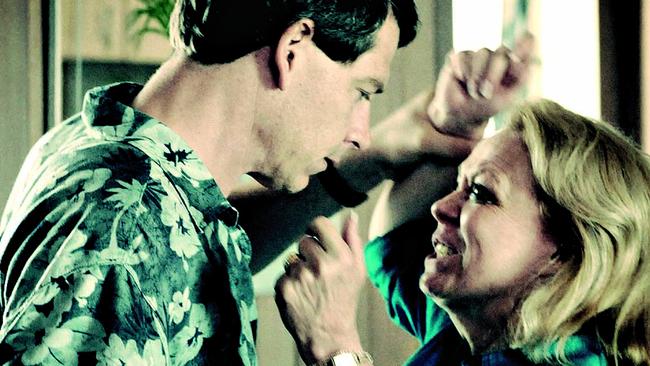
When Michôd first popped the hood on a particular brand of suburban Aussie male it wasn’t pretty. Animal Kingdom, the 2010 film he wrote and directed, launching his career in spectacular fashion, was peopled by dark and dangerous men, members of a Melbourne crime family living lives of such roiling menace it verged on operatic. Some of us still shudder on hearing Air Supply’s All Out of Love, so durably unsettling was the scene it accompanied: Ugly couch. Unconscious teenage girl. An off-kilter Ben Mendelsohn, staring.
The film, heralded now as an Australian classic, is the gift that keeps on giving for its cast and director. It kickstarted Hollywood careers for Mendelsohn and Jacki Weaver, who earned an Oscar nomination for her role as the sociopathic matriarch, and inspired Joel Edgerton and Guy Pearce to some of their finest work. For Michôd, who rolled into the Sundance Film Festival on nobody’s radar and walked away with a coveted jury prize, the movie was life-changing. “I’d spent the 10 years since film school struggling to even picture a world in which someone would give me millions of dollars to make a movie,” he says of his long apprenticeship in award-winning short films. “That I was actually even making Animal Kingdom at all was a giant leap for me, and then its reception was just icing on the cake.” Suddenly he was being feted by Hollywood and had his pick of projects. But the contrarian in him — the one that asserts Animal Kingdom is actually funny — came to the fore and Michôd returned to Australia to shoot The Rover, a small, spare outback western whose only link to Tinseltown was Twilight actor Robert Pattinson.
Only now comfortable writing “filmmaker” on his immigration card when pinballing between his home in Sydney and his base in LA, Michôd says he’s still plagued by insecurity. “When I’m making any film, there’s a strange schism between feeling like we’re doing something amazing and feeling like I am completely f. king this thing up,” he says. “It’s amazing how the two can coexist and oscillate back and forth. I don’t expect that feeling is ever going to go away.”
Here he lets slip something telling. “I’d love to wake up in the morning and think everything I did was amazing,” he says. “That must be an extraordinary feeling for those people who have it. They become objects of scorn for others but, man, their lives look … easy.” Could it be that his fascination with the rhino-hided world of alpha males stems from something akin to envy? He twists the edge of a flared-leaf rubber plant between his fingers and grins: “I wish I was delusional.”
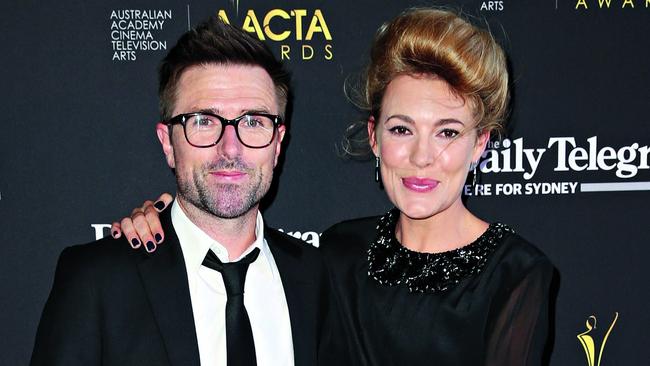
“Ah, America,” begins the voiceover that opens War Machine. “You beacon of composure and proportionate response.” Even before Pitt’s puffed-up general muscles into frame, Michôd’s $60 million Netflix original movie has nailed its colours to the mast. It’s a savage satire on the US military-industrial complex, what its writer-director calls “that self-sustaining machine of babble and jargon” whose only concern is winning. Netflix hails it “an absurdist war story for our times”.
Riffing on The Operators: The Wild and Terrifying Inside Story of America’s War in Afghanistan, a 2012 exposé by the late Rolling Stone journalist Michael Hastings, the film has Pitt as a fictionalised version of Stanley McChrystal, the four-star general who ran counter-insurgency operations in Afghanistan but came unstuck after an unguarded interview with Hastings. “It’s a comedy until it’s a tragedy, if you know what I mean,” Pitt has said.
The film had a long gestation period. “I started thinking about this movie 10 years ago, wanting to find a way into these theatres of war — Iraq or Afghanistan — and doing a lot of reading,” Michôd says. “Early on what was boggling my mind was trying to imagine what the experience of being sent into an environment like that would be like. Most of the early ideas I had were incredibly dark; really, really bleak war-movie ideas, which perhaps isn’t surprising given the tenor of my first two movies.”
Enter Brad Pitt with a maverick plan. Michôd had been on the A-lister’s radar even before Animal Kingdom thanks to his suite of short films. Pitt’s production company, Plan B Entertainment, had once tried to set up a feature based on the drug-smuggling book Marching Powder for Michôd to direct but, in the way of these things, it fell over before going into production. “I’m glad I never got to make that movie because, you know, I was young and just wagging my tail and probably didn’t know what I was doing,” Michôd says.
Pitt came to him with Hastings’ optioned book and “I found my way in almost immediately”, Michôd says. “It was a way of examining not just the darkness and sadness of war but its hubris and absurdity as well. I think there’s an extra element of horror you find at play when the men asked to fight these wars don’t actually know why they are fighting them.” He’d found a way to make his war movie. “Also knowing that I was writing the central character for Brad Pitt made me think it was a good bet,” he laughs.
War Machine, which also stars Ben Kingsley, Tilda Swinton and Topher Grace, is streaming giant Netflix’s most ambitious project to date, and a major step up from Michôd’s short films where he’d “call lunch and then have to run off and make the sandwiches”. The shoot ranged across Abu Dhabi, Berlin, London and Paris. He was in charge of 150 crew and responsible for telling one of the planet’s biggest stars to “move a little to the left”.
Yet it was only while having a post-work drink with fellow Australian filmmaker Justin Kurzel in London one night that Michôd allowed himself something resembling a pat on the back. He realised, in that moment, that as he was shooting scenes for War Machine in a former biscuit factory by the Thames, Kurzel and Animal Kingdom’s cinematographer Adam Arkapaw were also in London shooting the big-budget epic Assassin’s Creed and, across town, Greig Fraser, who had lensed Michôd’s 2007 short Crossbow, was working with Ben Mendelsohn on Rogue One: a Star Wars Story. “I just thought, ‘How did this happen?’” Michôd says. “These are all guys I was just making short films with a couple of years ago and now we’re making the biggest movies happening in London at that moment. I think it speaks to the pay-off that can come from the insanity of just hanging in there.
“The rest of it, the logistics, the creative part of it, is frog-in-boiling-water stuff. You know, you just walk on set and Brad’s there and, yeah, it does take a couple of days to familiarise yourself with an iconic personality that you have only previously known from TV and magazines. But the beauty of Brad is he loves directors, he loves being directed. He understands that good acting is always a collaboration between actor and director, and if you’re working with someone who knows that from the outset, the experience is only ever fun.”
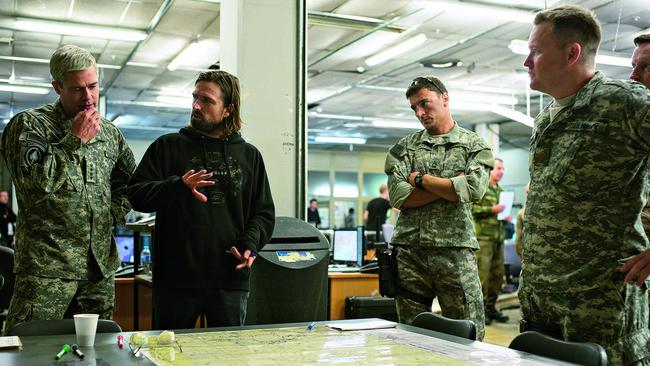
Michôd likes to run with a pack. It’s a jungle out there in the entertainment industry and the filmmaker has long sought — and found — support, comfort and inspiration in the presence of like-minded creatives. Early on, he found his tribe in Blue-Tongue Films, a collective that operates like an existential commune and includes some of the most interesting Australian filmmakers working today. Founded in 1996 by stuntman-turned-filmmaker Nash Edgerton with his brother Joel and Kieran Darcy-Smith, it has grown to include US film director Spencer Susser, Oscar nominee Luke Doolan and Michôd’s girlfriend, Foulkes, and is responsible for feature films The Square, Hesher, Wish You Were Here and Animal Kingdom.
Michôd was asked to join in 2001 after graduating from the Victorian College of the Arts. Despite a childhood obsession with Star Wars, the former Sydney Grammar student had come late to film, drifting until his mid-20s when he suddenly decided he’d attempt to carve out a career in the arts. “By then, I’d had profound, moving experiences consuming art of various kinds — records, books, movies — and I remember thinking I wanted to engage with the culture on that level,” he says. “I thought I would love to inspire those feelings that I’d had in somebody else. Given the choice, I probably would rather have done it in a rock band. But there was no school of rock’n’roll, so I applied to film school.”
He was “young and naive enough”, he says, to endure what turned out to be “10 years of privation” before returning from Melbourne to Sydney, broke and friendless, to take up a job as reporter, then editor, at the industry journal Inside Film. The work allowed Michôd to make ends meet, but it also afforded him a valuable “nuts and bolts” education in the dark arts of marketing, distribution and publicity.
Inside Film shared office space with Blue-Tongue Films and Michôd’s first interactions with its budding young filmmakers were fights over car spaces. “We started hanging out and I got invited into the fold before I’d even made anything,” he says. “Nash knew, and we all came to know very quickly, that given how delusional filmmaking feels when you’re young and don’t know if you’ve got what it takes, there’s something incredibly comforting about sharing that delusion with other people.”

The crew started off making edgy short films, jumping in and out of each other’s projects, but as their individual stars have risen, they find themselves together in the same room less often. “As the films started getting bigger, our various abilities to participate in one another’s projects became limited, but we all still talk to each other all the time,” says Michôd. “I think we still feel the same comfort in knowing that each other is around.”
Michôd co-wrote The Rover with Joel Edgerton, Hesher with Susser and various shorts with Nash Edgerton, and has another screenplay co-written with Joel in the pipeline. “Dave plays well with others,” says Nash from Mexico, where he’s just finished directing an untitled Hollywood project starring Joel alongside Charlize Theron and Michael Jackson’s daughter, Paris. “He’s a pleasure to collaborate with because, although he has strong opinions, he’s a good listener and has a great sense of humour.”
Los Angeles has been Michôd’s home-away-from-home for eight years, yet he still finds the place deeply weird. “As soon as I get a sniff that I don’t really need to be there right now, the first thing I do is get on a plane and go back to Australia,” he says. LA’s least weird neighbourhood, he believes, is Koreatown, a community just west of downtown with palm-lined streets and lots of hip ethnic eateries. Here he’s created his own buffer against the “disconnected unreality” of Tinseltown within the walls of a six-bedroom California bungalow he shares with another bunch of Aussie movie people: screenwriter Luke Davies, actor Alex O’Loughlin, and Foulkes, who is currently juggling at least four film and TV projects.
It’s essentially a grown-up share-house. And a whirring hive of creativity. “There are whiteboards set up in rooms all over the house, with different projects gestating,” Michôd says. “We generally do regular housemate shit but every now and then we’ll dive into each other’s projects.” War Machine, he says, was one project that benefited from workshopping sessions with Davies over breakfast. “Every morning for 10 days, we’d get up and Luke would very generously let me use him as a sounding board,” Michôd says. “An outlining process that might have taken me two months, I smashed through in 10 days because I had someone smart looking back at me.”
Michôd and Davies, who recently scored an Oscar nomination for his screenplay for Lion, have a joint venture in the works: a TV adaptation of Joseph Heller’s classic war satire, Catch-22, for the producers of True Detective. “Working with David is a kind of elevated pleasure, because his mind is always operating on these different planes,” says Davies. “Even while you’re dealing with the mundane stuff — say, working out the earliest basics of a three-act structure on a whiteboard — it’s those elevated planes where it’s most fun to hang out with him. He lifts you, in his quiet, deadpan way.”
Producer Liz Watts, who crashes in a spare room at the Koreatown house when she’s in LA, believes there’s something particularly Australian about these collaborations. “Forming those networks and having that camaraderie works really well when you’re working with others who share your vision,” she says. “Those relationships are really important to David; it feels like he really thrives on it.”
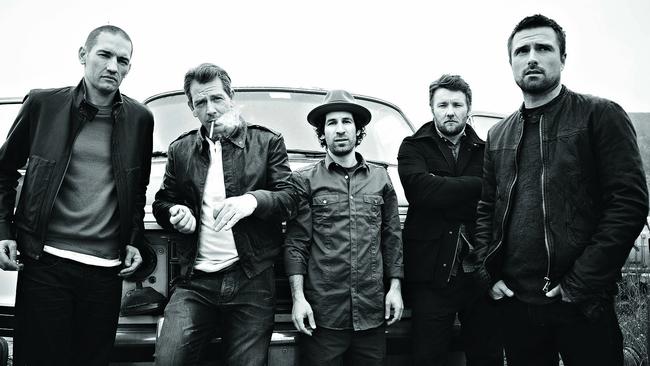
Back in Bondi, a storm is blowing in from the west. Glass-panelled doors rattle ominously and, on the balcony, a fretful wind lays the leaves of the houseplants almost flat. Michôd’s talking about his love and admiration for Francis Ford Coppola’s war epic Apocalypse Now, a film he watches at least once a year to fuel his creativity. “I’m just fascinated by the delusion that the people in these worlds frequently have that allows them to have such confidence and hubris, despite circumstances that, to me, would seem to lend themselves only to extreme anxiety,” he says, his voice barely audible over the rising wind. He leaps up to close the doors against the escalating squall and the room falls still. There’s a long silence, in which something suddenly occurs to him.
“Hang on a minute,” he says. “I’m directing massive movies with movie stars and hundreds of people and 40 trucks in the street — maybe I am one of those guys and I don’t even realise it. Maybe it’s just the frog-in-boiling-water again. I think I haven’t changed, but maybe I have?” he muses. “Maybe that’s the core of the delusion!”
Michôd furrows his brow. The storm outside, the thrashing plants, the rattling panes, all fall away and it’s as if he’s alone in the room, staring into his own heart of darkness. The horror. The horror.
Netflix will stream War Machine from May 26.


